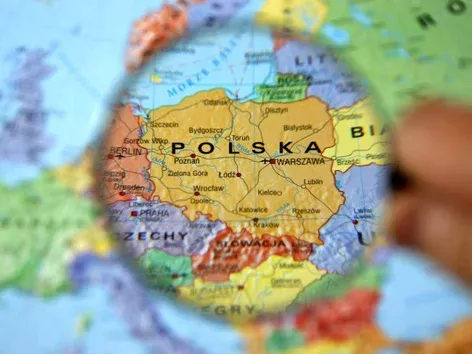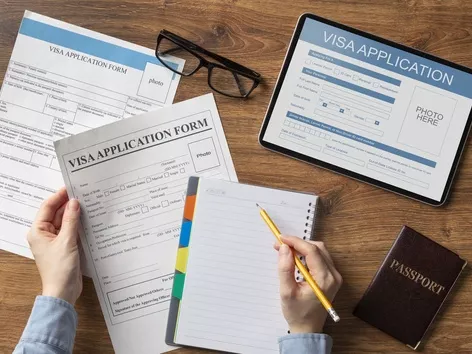Poland's new migration strategy towards refugees and migrants: what will change
- Main changes in the strategy
- Role of new institutions and autonomy of consuls
-
- Prioritizing security
- National return program
- Legalization of foreigners' stay
- A turnaround in asylum policy
- Integration programs and humanitarian stay
- Prioritizing security and controlling migration flows
- Admission of foreigners to the Polish labor market
- A point system for employees
- Inspection of employment agencies
- Educational migration and restrictions for foreign students
- Integration instead of assimilation
- Obtaining Polish citizenship will become more difficult
- Programs for repatriates and the Pole's Card
- When will the new strategy come into force?

Poland's new migration strategy aimed at regulating the flow of foreigners reflects the profound changes that await both labor migrants and refugees. Find out more about Poland's emphasis and the new mechanisms it is creating to control migration processes
Poland has adopted a new migration strategy until 2030, which will significantly affect the rules of stay and integration of foreigners in the country.
The document entitled “Comprehensive and Responsible Migration Strategy of Poland for 2025-2030” consists of several key aspects covering access to the territory of Poland, asylum, integration and participation in the labor market.
We will tell you what will change for Ukrainians in the coming years in the article.
Main changes in the strategy
1. Suspension of the right to asylum and national return program: Poland is considering the possibility of temporarily suspending the right to asylum in case of emergency, as well as introducing a return program for migrants who have failed to legalize their stay.
2. Changes in the procedure for obtaining citizenship and issuing visas: It is planned to revise the criteria for granting citizenship, in particular, to strengthen the requirements for the integration of migrants. The visa policy will also undergo changes - it is planned to introduce a “selective model” of visa issuance, which provides preferences for migrants from countries that are strategically important for Poland, as well as for those with unique skills.
3. New criteria for access to the labor market: New criteria will be introduced for foreigners who want to work in Poland, including the amount of wages and the need for workers to implement the country's strategic investments.
4. Changes for foreign students: Poland is strengthening control over foreign students to ensure their participation in the educational process and integration into Polish society.
5. Strengthening the border infrastructure: Special attention is paid to strengthening Polish borders to counteract illegal migration and abuse of asylum systems.
Role of new institutions and autonomy of consuls
The new strategy envisages the creation of a special central institution responsible for coordinating and implementing migration policy. This institution is planned to be formed on the basis of the current Office for Foreigners.
In addition, it is envisaged to increase the autonomy of consulates in making decisions on issuing visas. This is aimed at preventing pressure on consular officers and fighting corruption in the visa issuance process.
Prioritizing security
The Strategy emphasizes the importance of security in the management of migration processes. The Polish government intends to maintain control over the scale of migration flows, their goals and countries of origin. Poland will also continue to be critical of EU migration policy, especially the Migration and Asylum Pact, which it considers too simplistic.
National return program
One of the key aspects of the new strategy is the development of a national return program, which provides mechanisms for the voluntary and forced return of foreigners whose presence in Poland is deemed “unjustified or undesirable.” This program has two components:
1. Voluntary return: Foreigners can decide to return to their home countries on their own, having received appropriate assistance from Polish authorities.
2. Mandatory return: For those who do not fulfill the requirements of Polish law, a coercive mechanism will be applied.
Such measures are aimed at ensuring national security and controlling migration flows.
Don't want to miss important updates and useful materials? Subscribe to our weekly newsletter!
Legalization of foreigners' stay
An important change is the digitalization of residence legalization processes. The entire application procedure will be transferred to an online format, which will optimize the process and reduce the burden on voivodeship offices. Poland also intends to reduce staff turnover in state institutions responsible for processing residence permit applications.
In addition, the strategy envisages the exclusion of intermediaries who abuse the legalization system and submit unfounded applications. This will reduce the number of cases when foreigners receive residence permits “for the sake of appearance.”
A turnaround in asylum policy
One of the most controversial parts of the strategy concerns changes in asylum policy. The Polish government has announced the possibility of temporarily suspending the right to apply for international protection in certain regions or under certain conditions. This has caused heated debate in society.
The new policy envisages the possibility of denying access to the country to persons who use the asylum system as a tool for illegal border crossing or those who are considered a security threat. This approach is similar to the example of Finland, where similar restrictions are already in place.
The strategy also provides for the detention of foreigners if there are doubts about their safety for Polish society until the situation is fully clarified.
Integration programs and humanitarian stay
For those foreigners who successfully pass the procedure for international or national protection, the strategy provides for participation in comprehensive integration programs. These programs are aimed at facilitating the social and economic integration of migrants into Polish society. Progress in integration will be an important condition for further obtaining a permanent residence permit or Polish citizenship.
Separately, it is proposed to introduce the concept of humanitarian stay. This involves the creation of transparent and legal migration channels for foreigners who meet certain criteria but do not fall under standard migration rules.
Prioritizing security and controlling migration flows
Poland's entire migration policy until 2030 is based on the principle of national security. The government seeks to maintain control over migration flows by regulating their scale and countries of origin. Poland also advocates strengthening the EU's external borders, considering this a more effective approach than re-establishing internal border controls, as Germany has done.
Admission of foreigners to the Polish labor market
One of the key parts of the new strategy concerns the admission of foreigners to the Polish labor market. In the face of demographic and social changes, Poland is taking a cautious approach, avoiding excessive dependence on labor migration. Although Poland will continue to attract foreigners to fill labor shortages in certain professions, migration policy should not hinder the modernization and automation of the economy.
The main criteria for the admission of foreign workers include
- Originating from OECD countries or those with which Poland or the EU have readmission agreements.
- Possession of unique skills or professions that cannot be filled by local personnel.
- The level of remuneration must be in line with the level of Polish workers.
- Priority will be given to foreigners who are invited by employers to implement strategic investments for the economy or defense.
A point system for employees
The strategy also plans to introduce a point system similar to the systems in Australia, Canada, and the United Kingdom. Points will be awarded for certain competencies that are important for the Polish economy. This will ensure the influx of those migrants who can make a real contribution to the country's development.
Inspection of employment agencies
Another important element of the strategy will be enhanced inspection of employment agencies to eliminate violations and protect workers' rights. This should create a more transparent and legal system for attracting foreign labor.
Educational migration and restrictions for foreign students
In the field of educational migration, Poland plans to focus on eliminating situations where foreign students use their studies as a formality to obtain the right to work. The new rules provide for stricter admission requirements, including proof of language proficiency and verification of the actual start of studies. This will help reduce the number of students entering Poland for employment rather than studying.
Integration instead of assimilation
The new strategy emphasizes the integration of foreigners rather than their assimilation. The goal is to create conditions under which foreigners will respect local norms and values and take an active part in the life of Polish society. To this end, special integration programs will be developed for the most numerous migrants, such as Ukrainians. An important element will be learning Polish, which will be one of the key criteria for successful integration.
In the fight against religious radicalization and cultural practices that contradict Polish law, the strategy provides for the possibility of deportation of persons who do not comply with the established rules.
Obtaining Polish citizenship will become more difficult
Obtaining Polish citizenship will become more difficult. A “citizenship test” will be introduced, including knowledge of the Polish language, history and traditions. This innovation is intended to ensure that foreigners seeking to become Polish citizens meet the country's cultural and social standards.
Programs for repatriates and the Pole's Card
The Strategy also envisages a review of the procedures for granting repatriate status and the Pole's Card. These programs will be reformed to eliminate abuses, but at the same time, it is planned to expand support for repatriates, in particular through online Polish language learning programs.
When will the new strategy come into force?
Poland's new migration strategy is a draft that needs to be further approved and adopted by the government. After that, specific plans for the implementation of the strategy will be developed, divided into two stages: until 2027 and until 2030. In 2027, it is planned to review its implementation and make possible adjustments.
If you are planning to move to Poland or are already there and need help with legalization, employment, or visa, contact Visit Ukraine's migration lawyers. Experienced specialists will help you understand the new migration rules, prepare all the necessary documents and provide legal support at every stage of the process. Get professional advice today by following the link!
Want to know more? Read the latest news and useful materials about Ukraine and the world in the News section.
Our recommendation for a safe and comfortable trip:
Visit Ukraine Insurance - insurance for a safe stay abroad without unnecessary expenses;
Green Card - compulsory car insurance for traveling abroad;
Visit Ukraine Tickets - book tickets for buses, trains, and airplanes to/from Ukraine and between cities around the world;
Private Lawyer service - professional legal support on visa and migration issues;
Visit Ukraine Merch - buy patriotic clothing and accessories with worldwide delivery.
© 2018-2024, Visit Ukraine. Use, copying or reprinting of materials on this site is permitted only with a link (hyperlink for online publications) to Visit Ukraine.
All rights reserved.
Recommended articles
3 min
Cost of living
Norway has always attracted migrants from all over the world due to its high standard of living, stable economy and numerous employment opportunities. However, migration to Norway has its own nuances, which are expressed primarily in the cost of living in this European country. Find out what is the cost of living in Norway in 2024 so that your stay in this country is well planned and calculated
17 Oct. 2024
More details2 min
Documents
Digital Nomad visa: how it differs from regular visas and what are the benefits for remote workers
Digital Nomad visa provides legal residence for remote workers who work for foreign companies. Find out what rights to live and work it provides and how it differs from regular visas
17 Oct. 2024
More details2 min
Education
17 Ukrainian universities are included in the Times Higher Education World University Rankings 2025
Ukrainian universities have achieved record representation in the Times Higher Education World University Rankings. Find out which 17 higher education institutions from different cities of Ukraine were included in the prestigious list, how their activities were evaluated, and what prospects this event opens up for Ukrainian higher education institutions.
17 Oct. 2024
More details2 min
Transport
How to get to Ukraine from Thailand in 2024: convenient routes, entry rules and useful tips
In 2024, there will be no restrictions on entry into Ukraine for foreigners. However, the airspace still remains closed, so the travel route should be planned in advance. Find out how to get to Ukraine from Thailand and what rules for crossing the border are relevant this year
17 Oct. 2024
More details

